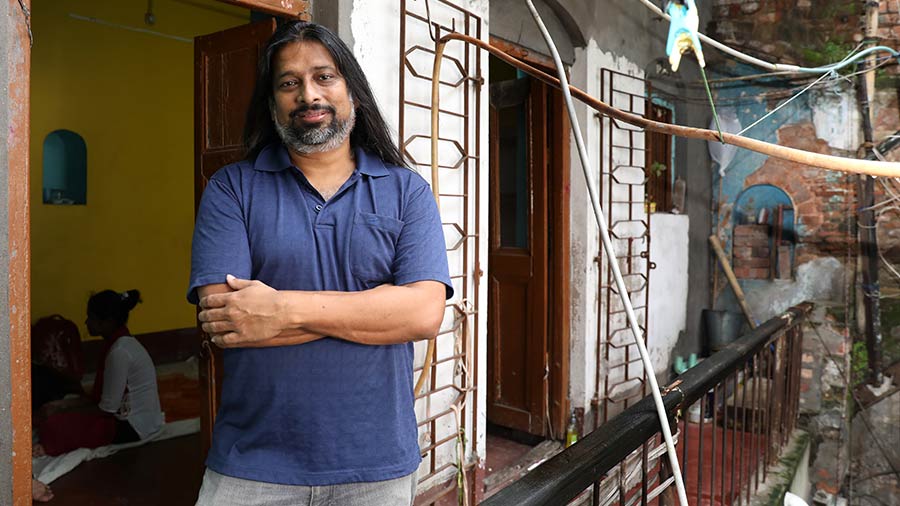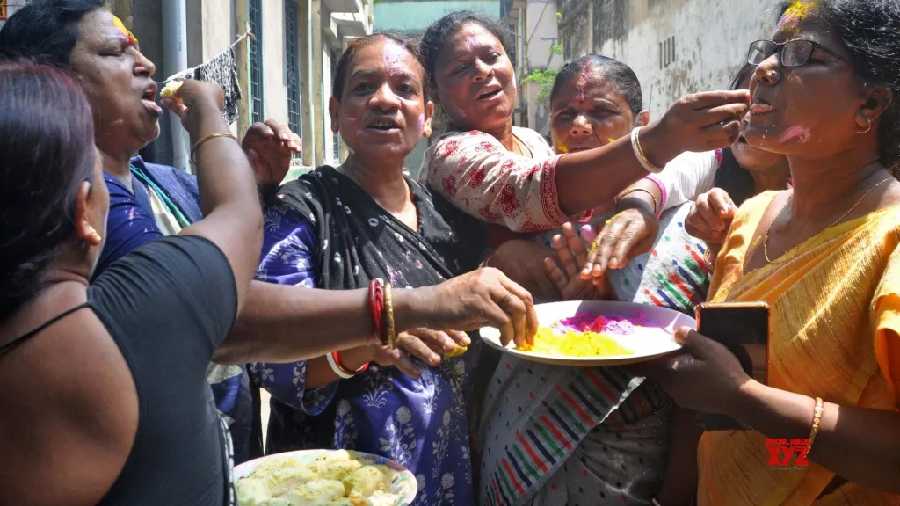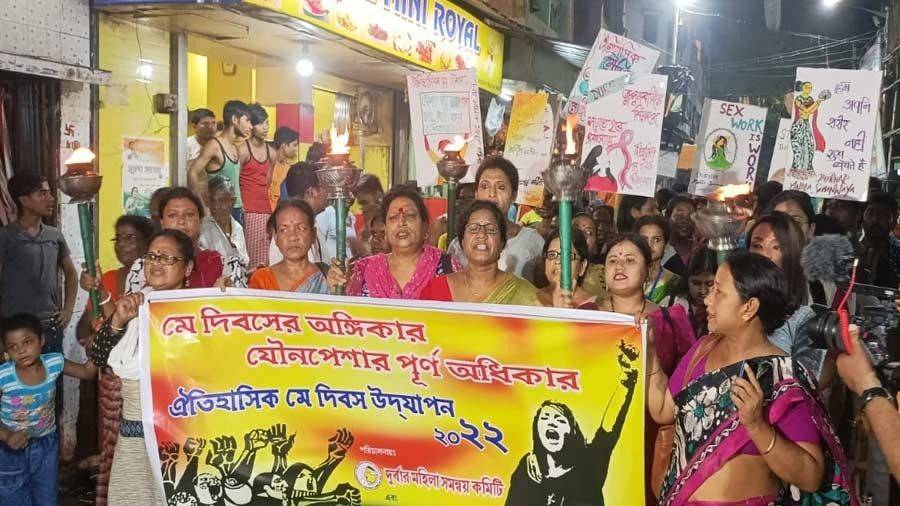A University of Pennsylvania professor with a Fulbright scholarship, Toorjo Ghose’s academic performance is impressive enough. But what sets him apart from other scholars is his passionate work in documenting the lives of sex workers of Sonagachi, helping them with essential resources and working for the community’s uplift.
My Kolkata caught up with him for a chat about sex workers and his role in their lives, with some Star Wars analogies thrown in.
First interactions with Kolkata’s sex workers
I was actually born in Bombay and grew up in Hyderabad and Delhi as a child. I was in Class VII or VIII when I came to Kolkata. My school was in Entally but we lived in Alipore. I would take a Rajabazar-bound bus and get down at Alipore police station, from where I would walk home to Judges Court Road. Both my school and my home were very close to red-light areas. The sex work community was everywhere when I was growing up. The funny thing about our posh areas is that they are contiguous to these red-light areas. In fact, there's one right next to Kalighat temple.
Growing up, the sex work and the workers were never invisible to us, we knew what was going on. It wasn’t this stigmatised space where “it's all about sex”. Similar to how the local paanwallah wasn’t just someone who made paan, he was the local dada who saw us growing up, I always felt that the women we interacted with were not just sex workers. They were not external to our social circles, we would talk to them. They were a part of the neighbourhood and people like the local shopkeepers, pharmacists and taxi drivers would engage with them normally.
Bringing groups of students from UPenn to Sonagachi since 2007
In 1990, after completing Class XII, I went to the US to study Physics. I was soon bored and shifted to Gender and Racial Studies. During that time, I became one of the first men to join the rape crisis centre and was trained to work with people who had been abused. After that, I did a master’s in Sociology and Social Work before going to the University of California Los Angeles (UCLA) to finish my PhD in Social Welfare. While studying in the US, I kept hearing how Indian women did not occupy public spaces or were very coy and, I thought, “That’s not the Indian woman I know”. I realised that the gender norms of middle-class India have been universalised for Western audiences as that’s who they see.
As someone who had grown up around sex workers, I saw women who were actually full of agency, negotiating street space, battling and engaging with men. It was always something I wanted to get back to studying. When I proposed this idea for my dissertation, I was denied permission to work on it by my professor, citing it as “too difficult to do international work” and “controversial”. So, I did it parallelly with my dissertation!
Around 2000, while I was still at UCLA, I came to Kolkata for 28 days with some scholars to start my research. This was back when the HIV pandemic had hit and it really brought sex workers into focus. They made us wait and for 26 days everyone (in the team) was asking me where I had brought them since we hadn’t been able to get anywhere with our research. Finally, on the 27th day, they called us in, seeing our genuine persistence. I remember a leader of the sex workers’ union telling me, “You’re only interested in us because of HIV. Otherwise, you wouldn’t care”. I think I did the best thing at that point by being honest. I replied, “You’re absolutely right, but that is what we want to do. I want to ask the world why we haven’t been interested in your stories till now”. That is what kicked off my association with them.
When I got my job at UPenn, I told them in my first year that I wanted to teach a class where I take students to India to work with me over the summer. I was told that there would be a lot of liability issues but people loved the class and I have been bringing groups of students to Sonagachi every year since 2007.
I proposed that I would teach a joint class to students from Presidency University and UPenn on Zoom. In this class, we cover a lot of texts about Indian feminism, from sex work to women’s movements and even the incorporation of feminism in the Indian state. While there is a Bureau for Women's Rights within the government, it also traditionally leaves out certain people like sex workers. For the final project, I invite students to work with me in Sonagachi. The projects have historically been on whatever the collective says is important to them, from issues impacting the children of sex workers, the transgender community, contraception, legal rights, and even dance dramas.
The pandemic effect: a new collective
COVID brought several challenges. Besides the struggle for economic survival, the old ways of doing things have been destroyed and people are making a grab for power. This is an additional reason behind my Fulbright proposal. My question was whether the old revolution would die because of the pandemic. I came with my students and found out that there is a new collective called Janashastha formed by some of the founding members of the old collective. I’ve known these women since 2000 when they founded the original revolution and they have remobilised. They’re helping workers across the city, from Tollygunge to Domjur to Sonagachi, providing resources and helping vulnerable children. Their spirit has freshly energised me after so many years.
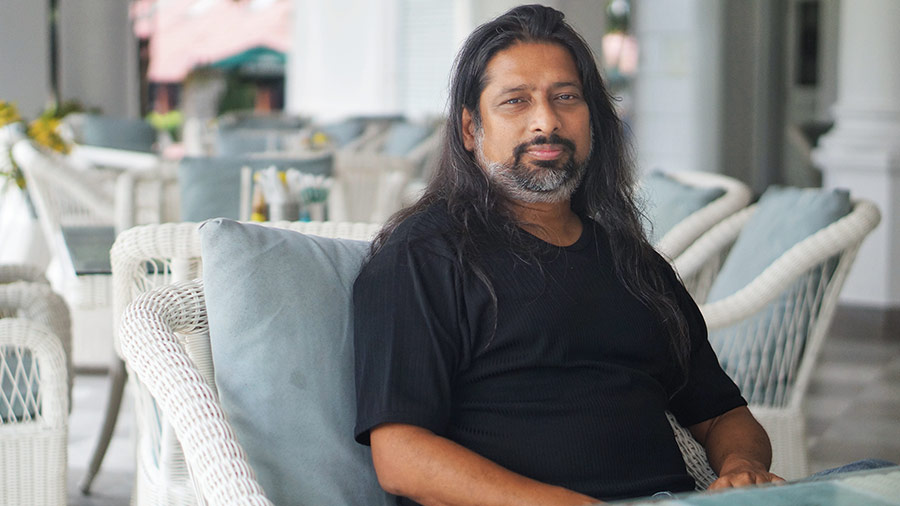
Toorjo Ghose is working on a book with the tentative title ‘Sex Work in the time of Two Pandemics’
Soumyajit DeyA book in the making: focus is on who is being forgotten
The book I’m currently writing is also an extension of the research I am doing under Fulbright, which aims to examine how pandemics impact sex workers. The provisional title is ‘Sex Work in the time of Two Pandemics’. I’m documenting COVID and it is heart-rending because you can see people whose entire life savings have been lost because of a rift within the group. Then again, I’m excited by the opportunity COVID has brought for the most vulnerable members of the group to freshly mobilise. I know that there are people at the helm of the revolution with power, but my question was always about the newly marginalised. Pandemics always bring this approach where you forget about the most vulnerable and focus on what is easy to do. The focus is on who is being forgotten. Documenting this for me has been an act of revolution too. Since stories are data and data have stories, I’m documenting both. The book will have complex theories about sex and sexuality but I intend it to be accessible. In order to study the impact of COVID, I needed six months here, which made the funding so important. I’m ending my documentation and returning to the US on September 4, but I will keep coming back.
The book is about sex work between the two pandemics (HIV and COVID). I wanted to examine how pandemics really put the focus on sex workers as they either start revolutions (during HIV) or end them (during COVID). The first revolution brought attention to sex workers not because the society was worried about them, but about themselves as they came in contact with the sex workers. The COVID pandemic is really out to get sex workers and the entire profession is being undermined because people are less likely to get intimate with the virus around. The pandemic also killed some of the major leaders of the movement. These two pandemics have created two different situations.
Striking back, like in Star Wars
That isn’t to say that there is no hope. A lot of good organising is happening which often gets hidden under the crisis. One part of the community has resources because of the old revolution and some of them have not been very kind to the others because crisis always brings out the survival of the fittest. But Janashastha has really mobilised all marginalised members. They have learnt some lessons and are planning to implement them in a new revolution. Every time I go to Sonagachi I see these women up and about. There are resource drives happening, mental and physical health services springing up, all organised by Janashastha. When I came during the pandemic, I was very sad because everything was in ashes and I had lost many close friends from the first movement. But these women coming up with a new alliance is amazing.
To use a Star Wars analogy, where the first pandemic was like A New Hope, the new pandemic is like The Empire Strikes Back. It felt like fate went, ‘You’re having a sex workers revolution? I’m going to strike back!’ Luke, aami tor baba! (laughs) How much more Bengali can you get? The remobilisation feels like Return of the Jedi, where it is an epic battle, but is also complicated.
Bridge between academic writing and creating reading material for people
Within documentation, finding the bridge between academic writing and creating reading material for people has been one of my guiding questions. For this, I’ve translated my work into various forums, one being academic papers. I’ve also started the MSW MFA programme at UPenn, which is the first of its kind in the country. Here, we use the arts as a way of engaging with our ideas so that everyone has access to it. I’ve also been working on a thriller multi-episodic script based on my experiences in Sonagachi with some collaborators in Mumbai. While it’s fiction, the core ideas are inspired by the stories I have come across, without appropriating someone’s experience. I also do a lot of poetry performances infused with these stories. I feel a part of my academic work is to go beyond these papers. The most gratifying thing about teaching is working with the students on ground. Every group that comes builds on the previous projects and I’ve created archives based on them. Many students get so involved in the work that they come back for longer periods.
Financially insecure during the pandemic, a lot of middle-class women would go to Sonagachi
One of the fastest-growing demographics during COVID was middle-class women. A lot of them were financially insecure during the pandemic. After dropping their kids to school, while their husbands were at work, they would go to Sonagachi, for what is essentially known as ‘flying sex work’ where they returned home in the evening. This kind of work isn’t connected to a brothel and it leaves them very vulnerable to violence because they don’t have any support.
Because of the learnings of the old revolution, the new one is being built on its foundation. I went to Domjur the other day and was amazed to see the work that was being done. Hundreds of sex workers were up and about with government organisations, NGOs, private organisations and researchers. The first alliance took years to form, but now we all know what to do, so things are moving at double the pace.
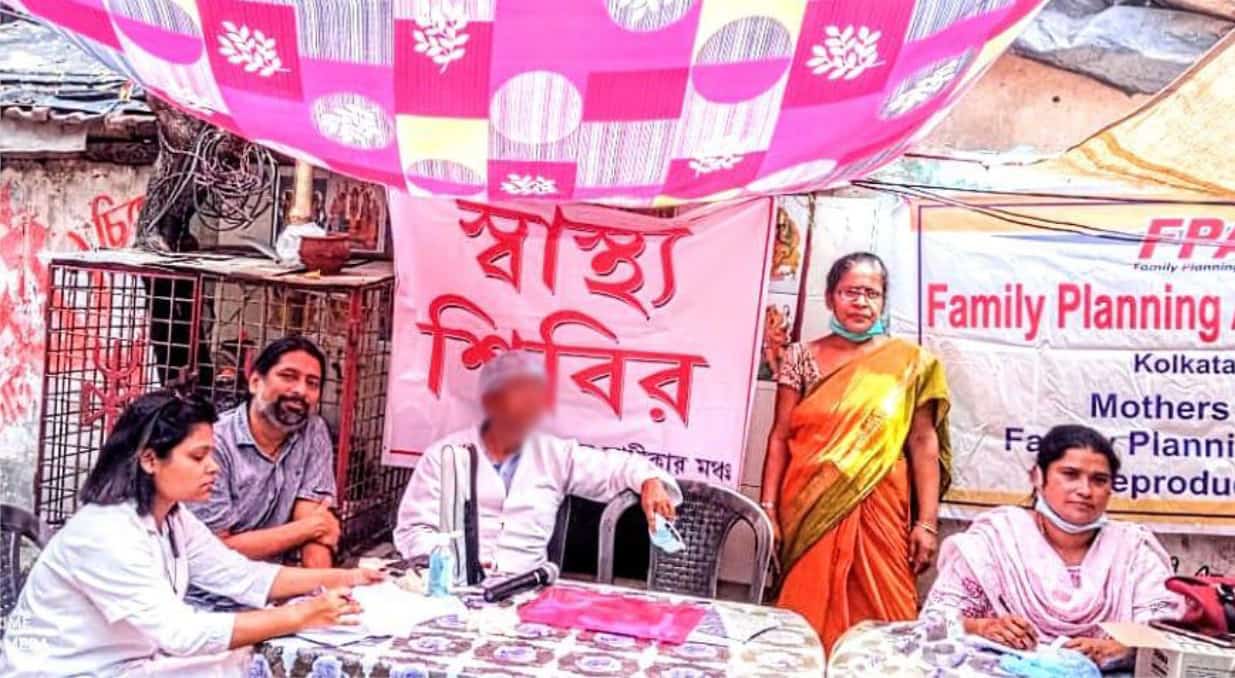
A health service clinic organised by Janashastha at a red-light area of Tollygunge
Legal and financial rights of sex workers
The death of major leaders and the fear that intimacy will lead to COVID, have led to an obvious impact on the finances of established sex workers, too. Due to the power struggle within the old collective, there have been major discrepancies regarding who controls the funds. Workers in the lower rungs still get paid in cash and banks are not enthusiastic about accommodating their savings. If the old fund is dead, they need a new space to ensure their security. One of the primary goals of the community is to secure a pension from the state government for older members of the community. Having such a collective fund will allow sex workers to exist beyond sex work when they can’t get clients anymore. The Supreme Court has built a platform for sex workers’ rights with their recent ruling, so this domain is a part of the vocabulary of regular rights that we talk about.
That being said, the decriminalisation of sex work is complicated. The law has a lot of saviour complex. While the sex workers themselves aren’t criminalised, all things around sex work still are. There is still an assumption that these women are individuals who have been trafficked, whereas the reality is that most sex workers are mothers and they actually support entire families with their earnings.
Sex work is hugely important in the informal economy of India
What we don’t realise is that a massive chunk of the poor are engaged in the sex work industry one way or the other because it is one of the most steady forms of income. The cars and corporate jobs we see are only 10 per cent of India, the rest of the country is in the informal sector. Sex work is hugely important in the informal economy of India. Women in the informal sector mostly work in construction or as domestic help. Many of these jobs have an element of coerced sex work. These women realise that if they are required to do sex work twice, they might as well get paid for it. They are supporting entire village economies. A major proportion of women and transgenders also do other work throughout the year but come to red-light areas for seasonal work. Sex workers aren’t a small union. Currently, the national union of sex workers has approximately 5 million members.
Society tries to force them into invisibility, but their business goes against it. In fact, economically, entire neighbourhoods are dependent on sex work. The whole commerce in a red-light area, be it food, medicines or tourism runs because of their presence. This has been the case for centuries, it even goes back to pre-British times. Sonagachi came up because the lavish north Calcutta estates were right opposite to them. Even today, red-light areas aren’t outside the city because people need them to be within the city. Kolkata probably has 25 such sites for sex work in total. One can only imagine the number of livelihoods they support.
They also bring fresh perspectives to sexuality and sex positivity
Just like every other community, the sex work community is very complicated. It is not just one community. There are multiple sub-communities within it and people need to realise that. Moreover, they aren’t just sex workers. They also bring fresh perspectives to sexuality and sex positivity. Sex work and pleasure aren’t this dichotomous thing for them, there is this fluidity. Some of my friends from the community have told me that there are some rare customers that they do get pleasure from. And, of course, sex work is work, but isn’t a lot of work also sex work? Women often have to fulfil sexual duties in marriage, and they aren’t even paid for it.
That being said, the work around the Sonagachi project has already led to a lot of perceptual changes. The ‘Buladi’ campaign was from the collective and went a long way in establishing awareness around using condoms. Today, Janashastha is very visible on the field. All these efforts have helped create a world where they have gone from being called prostitutes to sex workers. However, there are new challenges to their visibility which particularly stem from how they are not one united community. We need to be aware of the ones who are lost in the conversation because they are not the superstars. I don’t think much besides general perception has changed for them. Women are still getting arrested and beaten up, sometimes by their own community.
It is their mic, it was never in our hands, we grabbed it from them
People who wish to engage with them should know that they can’t be rescuing them. The workers are the experts of their lives, we aren’t. We have to be honest about doing this work every day. It is about them. It is their mic, it was never in our hands, we grabbed it from them. I also feel that the more you think you’re objective, the more you’re siding with the norm. I do group therapy projects where we train sex workers to become therapists and practitioners. But I’m a participant observer who is immersed in it, I don’t draw the line. It is important for them to understand what is written about them, and become owners of the knowledge produced about them.
Sex work areas are the safest places in the city
There are always some challenges as a part of ethnographic work. But I’ve grown up in Kolkata and I have this hair (points to his long hair and laughs) so it helps a bit. I’m also a part of the neighbourhood and this is the work I do 90 per cent of the time. Even in Philadelphia, I work in the so-called ‘bad neighbourhoods’, in a centre for people coming out of prison. My issue is never for my safety, but for theirs. I have never really felt unsafe, but I always worry whether my work turns attention to them, to make them feel unsafe. I actually feel that sex work areas are the safest places in the city, because they are so monitored. Random acts of violence will not break out. My students from the US are here all the time and they are always protected by the collective.
Most of my best friends are from Sonagachi… I love this Kolkata
I never pretend to be a part of the community. I’m always a collaborator and an ally. I have a particular role in terms of documentation and helping with resources, but I never take on the identity of being the community’s spokesperson. This is precisely why me and my students always ask them how we can offer our services, rather than proceeding with a predetermined plan. This movement isn’t about any individual, it is about the collective. The problem arises when Darth Vader thinks it is his Empire! The collective speaks with its own voice.
Besides that, most of my best friends are from Sonagachi, because that’s where I feel most at home. It’s exactly how for people from the vicinity, they aren’t sex workers, they are didi and dada. We have a long-term relationship, where I’ve hosted them at conferences in my varsity and they’ve even attended my wedding. My father, when asked about my whereabouts at gatherings, often says, “He’s coming, he’s at Sonagachi right now,” without any explanation (chuckles)! Documenting this is a very interesting way for me to bring my Kolkata to the world.
I think Kolkata has a lot of heart and this work could only happen here. Being a socialist city, the concept of a sex workers’ union really connects with the old ways of thinking and our culture promotes strong working women. I love this Kolkata, I've never lost touch with it since I first came here in 1990. This is what I keep coming back to.


